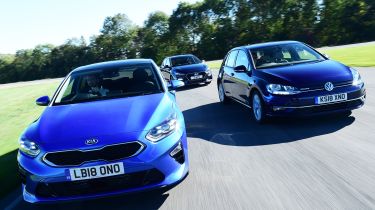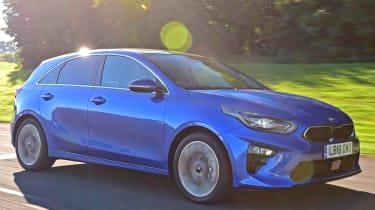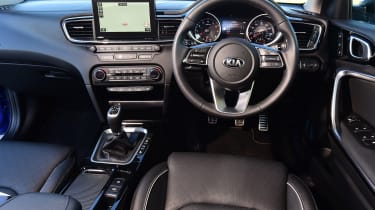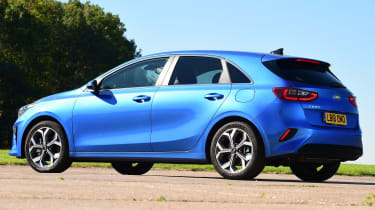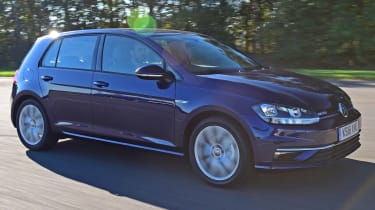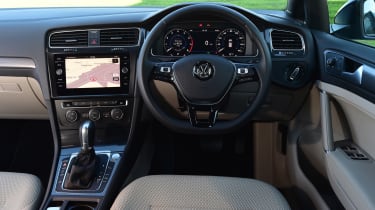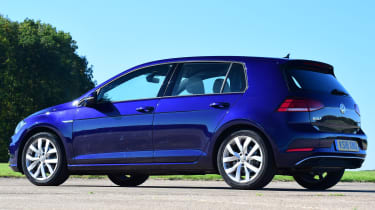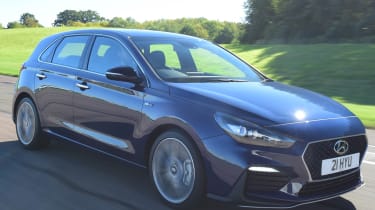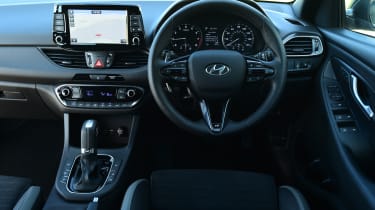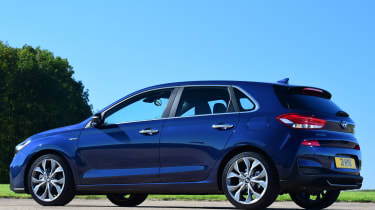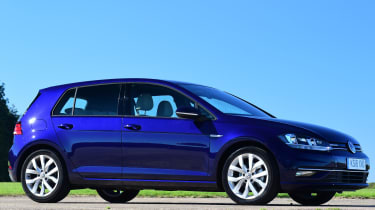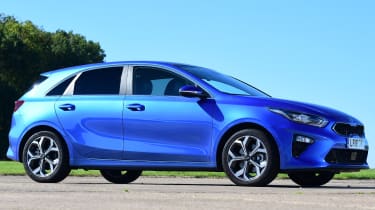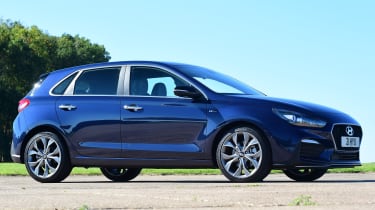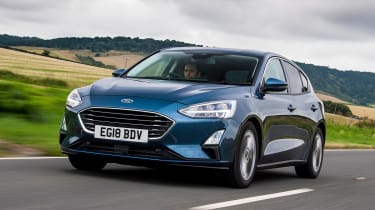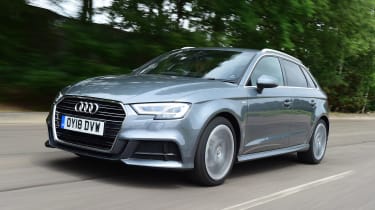Kia Ceed vs Volkswagen Golf vs Hyundai i30
New Kia Ceed locks horns with our top family hatch, the VW Golf, and the Hyundai i30 in fresh N-Line spec
When we look back on this decade, there’s every chance that it will be seen partly as the time where South Korea took over the consumer world.
Companies that make everything from TVs, smartphones and, crucially here, cars are reporting huge sales around the world, and with good reason. Kia is one firm that’s made great leaps and bounds in such a short period of time, and the brand’s latest Ceed family hatch is aiming to continue that trend.
Going up against Kia’s latest mainstream model is the most established rival there is in this class: the Volkswagen Golf. It practically invented the segment that it still dominates today, so in every sense it’s the benchmark for the new Ceed.
But the Kia also has to beat competition from much closer to home in the form of the Hyundai i30. We test it here in new N-Line + trim, which looks sporty and matches the First Edition Kia for kit, but is cheaper. Do either of these Korean hatches have what it takes to beat the Golf? And if so, which is the better buy?
Kia Ceed
| Model: | Kia Ceed 1.4 T-GDi DCT First Edition |
| Price: | £26,850 |
| Engine: | 1.4-litre 4cyl petrol turbo, 138bhp |
| 0-60mph: | 8.8 seconds |
| Test Economy: | 38.0mpg/8.4mpl |
| CO2: | 127g/km |
| Annual Road Tax: | £140 |
This is the all-new Kia Ceed. The brand has removed the apostrophe from the previous model’s name, partly to help customers searching online to find it more easily. The car we’re testing is a top-spec First Edition model with a 1.4-litre turbo petrol engine and auto gearbox, priced from £26,850.
Used - available now
The changes Kia has made to improve the Ceed’s driving dynamics have paid off. Where the previous model was comfortable enough, it wasn’t much fun, but that has all changed now because it rides and handles nearly as well as the Golf.
It’s compliant and soaks up lumps and bumps well, although larger imperfections will still upset the Kia where the Golf remains composed. But at the same time, body roll is well controlled, the steering is direct, there’s lots of grip from those sticky tyres and even a touch of adjustability on the throttle. It’s no Ford Focus, but the Ceed rewards being driven hard in a way that the previous version – and even its sister car, the Hyundai i30 – simply doesn’t.
It’s a shame then that this auto model’s dual-clutch transmission dampens its appeal. The gearbox isn’t as swift to change, nor as smooth at low speed, as the DSG in the VW Golf. We’d choose a manual Ceed instead, although the same is true of the Golf. The 1.4-litre turbocharged four-cylinder engine isn’t as refined as the Golf’s 1.5-litre petrol, but it sounds okay and is flexible, too. You can rev it hard if you want to enjoy a stretch of road, but its low-down torque is strong enough so that you can take it easy if you wish.
The Kia’s dual-clutch automatic is much better implemented than the similar unit in the Hyundai here. It’s not perfect because, like the VW’s DSG, it occasionally delivers clunky shifts, but on the whole it’s smooth and swaps its ratios neatly. The Ceed was a tenth of a second quicker than the i30 from 30-50mph in third and fourth gear, at 3.3 and 4.5 seconds respectively, but was a tenth slower from 50-70mph in fifth, taking 6.6 seconds.
The Golf was faster than both rivals in all of those tests, although the Koreans were quicker than the VW from 50-70mph in top gear, with the Kia and Hyundai taking 10.4 and 10.2 seconds respectively to beat the Golf’s time of 11.0 seconds.
Testers' notes: “The similarities between the Kia and Hyundai are obvious. Both have the same engine and gearbox, and even the infotainment systems are very similar, but the Kia is better to drive.”
Volkswagen Golf
| Model: | Volkswagen Golf 1.5 TSI Evo 150 DSG GT 5dr |
| Price: | £26,090 |
| Engine: | 1.5-litre 4cyl petrol turbo, 148bhp |
| 0-60mph: | 7.8 seconds |
| Test Economy: | 38.6mpg/8.5mpl |
| CO2: | 119g/km |
| Annual Road Tax: | £140 |
The Volkswagen Golf is our favourite family hatchback and is the benchmark in this class, offering incredible all-round appeal. Here we’re testing it in 1.5 TSI DSG form, in GT trim (although the car you see in our pictures is an SE Nav-spec model). The GT costs from £26,090, so is £760 cheaper than the Ceed First Edition.
The 1.5 TSI petrol engine in the Golf is the most powerful here, with 148bhp compared to 138bhp in both rivals. It has slightly more torque as well, at 250Nm while the Korean duo have 242Nm.
In our track tests the Golf performed well, recording a 6.8-second 30-70mph time through the gears, which was faster than both of its competitors.
In fact, the Golf was faster from 0-60mph than the Ceed and i30 as well, taking just 7.8 seconds to complete the benchmark sprint. Plus, its 3.2-second time from 30-50mph in third gear was impressive, again beating both of the Korean models.
While the 1.4-litre engine used in the Kia and Hyundai is quiet at idle, the Golf’s engine is quieter when you bring the revs up, and it’s more hushed at speed than its rivals’ motors. It’s not quite as fun to rev as the unit in the Ceed and i30, but the extra performance will make up for that for many buyers.
The Golf’s DSG auto box is smoother than the DCT transmission fitted in the Kia and Hyundai in most situations. It changes more quickly in manual mode, and that extra responsiveness is important when you’re driving quickly, because you’re rarely left waiting for a shift in the VW. However, the gearbox isn’t perfect, and at low speed it can feel a bit jerky. If you really want an auto, the Golf’s box is best, but we’d save some cash and buy the manual.
Even Golfs without the optional adaptive dampers are comfortable, and aren’t upset too much by harsh bumps, even while cornering. However, we’d still pick the upgrade, because it turns the Golf into one of the best-riding cars in its class.
That means the VW is the best car for motorway trips, because it’s refined at speed, but it’s also fun to drive on twisty roads. The steering lacks feel, but it’s direct enough to enjoy, and neither rival here has a better set-up. Grip is strong as well, although the sportier tyres fitted to both competitors meant they had slightly better bite than the Volkswagen.
Testers' notes: “Add the £495 Active Info Display to the spec list to get a 12.3-inch display screen instead of traditional analogue dials. It’s one of the best systems of its type and is a hi-tech option that’s well worth having.”
Hyundai i30
| Model: | Hyundai i30 1.4 T-GDi DCT N-Line + |
| Price: | £24,255 |
| Engine: | 1.4-litre 4cyl petrol turbo, 138bhp |
| 0-60mph: | 8.5 seconds |
| Test Economy: | 32.6mpg/7.2mpl |
| CO2: | 129g/km |
| Annual Road Tax: | £140 |
Hyundai’s i30 family hatch has never stood out in this crowded class. While it’s practical and offers good tech, its disappointing driving dynamics have held it back. But can this N-Line + model (priced from £24,255 in 1.4 T-GDi DCT form) change that?
While most Hyundai i30 models ride smoothly, the large wheels and re-tuned suspension on this N-Line have compromised the quality slightly, while doing little to add to the dull driving experience.
The Hyundai doesn’t ride or handle as well as the Kia or the Golf, because its steering is numb and the suspension isn’t as compliant. However, the premium rubber on our car meant it was very grippy, but mid-corner bumps upset the i30 more than the Kia due to the firmer, less sophisticated-feeling set-up.
In short, the N-Line trades ride quality for a barely noticeable increase in driver engagement, and both rivals here are more fun to drive. It does at least share the same peppy 1.4-litre four-cylinder engine as the Kia, which has strong low-down torque while still relishing revs. It’s no hot hatch, but there’s a hint of sportiness to the exhaust note, at least.
Even though the i30 has the same seven-speed dual-clutch gearbox as the Kia, it behaves very differently in the Hyundai. From a standstill the i30 allows more revs before it engages the clutch, which helped improved its 0-60mph time; it beat the Ceed by three tenths of a second. Yet the transmission is frustrating when on the road because it pauses, then lurches forward at junctions if you ask for a reasonably-quick getaway.
Plus, the i30’s sporty aspirations in N-Line trim have filtered through to the gearbox, and although it does change gear quickly (the Hyundai took 7.5 seconds to go from 30-70mph through the gears, half a second quicker than the Ceed), it’s too keen to hold on to ratios and ultimately isn’t as well calibrated as the Kia’s. The DSG in the Golf, along with its slightly more powerful engine, meant that the VW was more than half a second quicker than the i30 in the same test.
The slightly lumpy ride means the i30 is the least comfortable car for motorway trips, although it’s not by a huge margin. Wind and road noise do tend to build up at speed, but the engine is very quiet at idle.
Testers' notes
“If you want to buy a sporty i30, then consider going for an i30 N instead. The flagship of the i30 range is only a little more expensive than this N-Line + car and is significantly more fun to drive.”
Verdict
First place: Volkswagen Golf
The Golf offers almost everything you’d want from a family hatch. It’s practical and economical, there’s plenty of space inside and the ride soaks up bumps sweetly, even on the roughest roads. At the same time, it’s fun to drive, with good body control and a punchy but smooth petrol engine. It doesn’t have as much kit as the Ceed, but it’s cheaper and still gets lots of features.
Second place: Kia Ceed
This new Ceed is the best version yet. It’s genuinely enjoyable to drive, but balances this with a smooth ride and comfort. The Kia’s not quite as well sorted as the Golf, but it runs it much closer than you’d think. It’s practical and gets loads of kit, but is held back here by its higher price in First Edition form. Get the specification right and the Ceed is a very good choice.
Third place: Hyundai i30
The i30 is spacious, well equipped and features an excellent infotainment system, but this N-Line model’s ride is disappointing. The handling isn’t much improved, and it’s difficult to feel the link to the i30N. Although you get lots of equipment to match its rivals at a more affordable price, the harsher ride and weaker gearbox mean that this isn’t the right pick in the i30 line-up.
Rivals
New: Ford Focus
Price: £23,440Engine: 1.5-litre 4cyl, 148bhp
The Ford Focus is the best car in its class to drive, and will soon be available with a 1.5-litre engine to match the Golf’s, along with an eight-speed automatic gearbox. It also comes well equipped in higher-spec Titanium trim.
Used: Audi A3 Sportback
Price: £24,500Engine: 1.5-litre 4cyl, 148bhp
A more premium option in this class, the Audi A3 is also available with the Golf’s 1.5-litre petrol engine. We found one example with delivery miles for only £24,500, which is competitive with its rivals in this test.
Figures
| Volkswagen Golf 1.5 TSI Evo 150 DSG GT 5dr | Kia Ceed 1.4 T-GDi DCT First Edition | Hyundai i30 1.4 T-GDi DCT N-Line + | |
| On the road price/total as tested | £26,090/£26,090 | £26,850,£26,850 | £24,255/£25,090 |
| Residual value (after 3yrs/36,000) | £10,593/40.6% | £9,175/34.2% | £8,450/34.8% |
| Depreciation | £15,497 | £17,675 | £15,805 |
| Annual tax liability std/higher rate | £1,242/£2,483 | £1,385/£2,769 | £1,250/£2,500 |
| Annual fuel cost (12k/20k miles) | £1,853/£3,088 | £1,882/£3,137 | £2,194/£3,656 |
| Insurance group/quote/VED | 19/£376/£140 | 20/£446/£140 | 15/£397/£140 |
| Cost of 1st/2nd/3rd service | £164/£329/£164 | £429 (3 years) | £129/£222/£136 |
| Length/wheelbase | 4,258/2,620mm | 4,310/2,650mm | 4,340/2,650mm |
| Height/width | 1,492/1,799 | 1,447/1,800mm | 1,455/1,795mm |
| Engine | 4cyl in-line/1,498cc | 4cyl in-line/1,353cc | 4cyl in-line/1,353cc |
| Peak power/revs | 148/5,000 bhp/rpm | 138/6,000 bhp/rpm | 138/6,000 bhp/rpm |
| Peak torque/revs | 250/1,500 Nm/rpm | 242/1,500 Nm/rpm | 242/1,500 Nm/rpm |
| Transmission | 7-spd dual-clutch auto/fwd | 7-spd DCT auto/fwd | 7-spd DCT auto/fwd |
| Fuel tank capacity/spare wheel | 50 litres/space saver | 50 litres/space saver | 50 litres/space saver |
| Boot capacity (seats up/down) | 380/1,270 litres | 395/1,291 litres | 395/1,301 litres |
| Kerbweight/payload/towing weight | 1,317/568/1,500kg | 1,345/505/1,000kg | 1,388/610/1,400kg |
| Turning circle | 10.9 metres | N/A | 10.6 metres |
| Basic warranty (miles)/recovery | 3yrs (60,000)/3yrs | 7yrs (100,000)/1yr | 5yrs (unlimited)/1yr |
| Driver Power manufacturer/dealer pos. | 5th/18th | 8th/7th | 15th/12th |
| NCAP: Adult/child/ped./assist/stars | 94/89/65/71/5 (2012) | N/A | 88/84/64/68/5 (2017) |
| 0-60/30-70mph | 7.8/6.8 secs | 8.8/8.0 secs | 8.5/7.5 secs |
| 30-50mph in 3rd/4th | 3.2/4.2 secs | 3.3/4.5 secs | 3.4/4.6 secs |
| 50-70mph in 5th/6th/7th/8th | 6.4/8.5/11.0 secs | 6.6/8.1/10.4 secs | 6.5/7.9/10.2 secs |
| Top speed/rpm at 70mph | 134mph/2,000rpm | 128mph/2,100rpm | 127mph/2,100rpm |
| Braking 70-0/60-0/30-0mph | 48.3/38.0/11.5m | 50.5/32.4/8.9m | 46.2/35.4/9.1m |
| Noise outside/idle/30/70mph | 70/44/63/72dB | 58/42/64/74dB | 57/39/68/78dB |
| Auto Express econ. (mpg/mpl)/range | 38.6/8.5/425 miles | 38.0/8.4/418 miles | 32.6/7.2/359 miles |
| Govt urban/extra-urban/combined | 45.6/65.7/56.5mpg | 42.8/57.6/50.4mpg | 42.2/55.4/49.6mpg |
| Govt urban/extra-urban/combined | 10.0/14.5/12.4mpl | 9.4/12.7/11.1mpl | 9.3/12.2/10.9mpl |
| Actual/claimed CO2/tax bracket | 169/119g/km /24% | 172/127g/km/26% | 200/129g/km/26% |
| Airbags/Isofix/park sensors/camera | Seven/yes/yes/£340 | Six/yes/yes/yes | Six/yes/yes/yes |
| Auto box/lane-keep/blind spot/AEB | Yes/£550*/£1,120*/yes | Yes/yes/yes/yes | Yes/yes/no/yes |
| Climate ctrl/cruise/leather/heat seats | £425/yes/£1,900/£400* | Yes/yes/yes/yes | Yes/yes/yes/yes |
| Met paint/LEDs/keyless/pwr tailgate | £575/£995/£375/no | Yes/yes/yes/no | £585/yes/yes/no |
| Nav/dig dash/DAB/connected services | Yes/£495/yes/yes | Yes/no/yes/yes | £250*/no/yes/£250* |
| Wireless charge/CarPlay/Android Auto | No/yes/yes | Yes/yes/yes | No/yes/yes |
